TFS in the Cloud: 5 users for free!
 Application lifecycle management is a very important approach that allows you to create high-quality systems. But the full creation of the ALM environment and the adjustment of tools may require the creation of a complex infrastructure. That is why a year ago, within the framework of the first conference // Build /, the tfspreviev.com service was launched in test operation. In fact, this is a cloud version of Team Foundation Server, which is ready for use immediately. Yesterday the long-awaited RTM of this service took place. A pleasant surprise was the fact that it is free for teams of up to 5 people.
Application lifecycle management is a very important approach that allows you to create high-quality systems. But the full creation of the ALM environment and the adjustment of tools may require the creation of a complex infrastructure. That is why a year ago, within the framework of the first conference // Build /, the tfspreviev.com service was launched in test operation. In fact, this is a cloud version of Team Foundation Server, which is ready for use immediately. Yesterday the long-awaited RTM of this service took place. A pleasant surprise was the fact that it is free for teams of up to 5 people.During the plenary session, Jason Zander made an announcement about the availability of Team Foundation Service. Right now you can register at tfs.visualstudio.com and in a few minutes create a complete ALM environment.
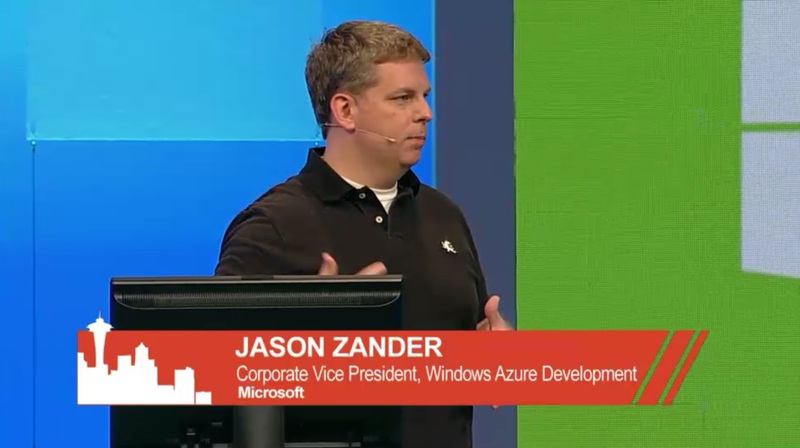
All in one
The Team Foundation Services complex includes all the necessary tools, including a version control subsystem with the necessary set of branch and merge functions, associating changes in the code with tasks, errors, requirements and other work items. Additionally, it is possible to organize the Code Review process, which, as practice shows, significantly improves the quality of the created applications:

How are you?
The TFS start page shows the main indicators of your project and can be easily configured for your needs:
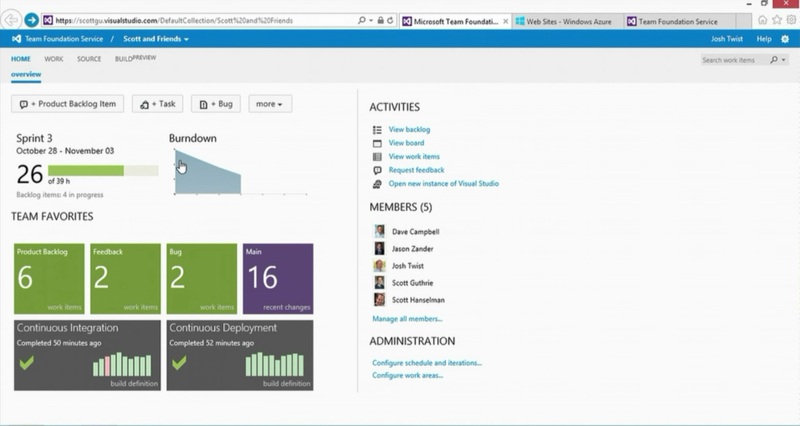
')
Requirements Management
Work on projects is also not possible without requirements management tools:
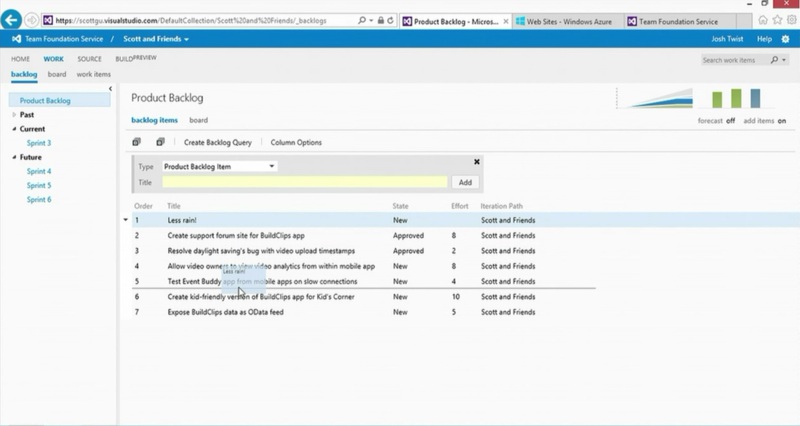
In the future, the list of requirements can be selected for implementation and enter into any iteration (sprint). At the same time, you have the opportunity to forecast the amount of work based on the work already done:
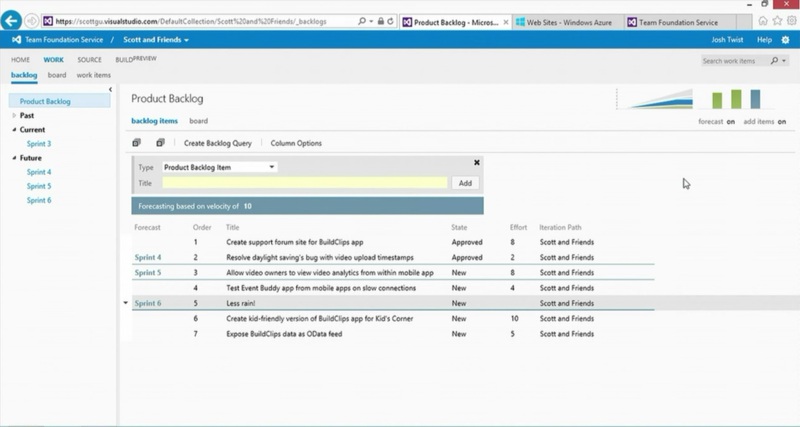
Planning
Detailed planning of iterations (sprint) is carried out on the basis of previously entered data on the duration of iterations and the amount of work that team members can perform. When you make changes to the plan, the information in the right panel about the command load is updated instantly:
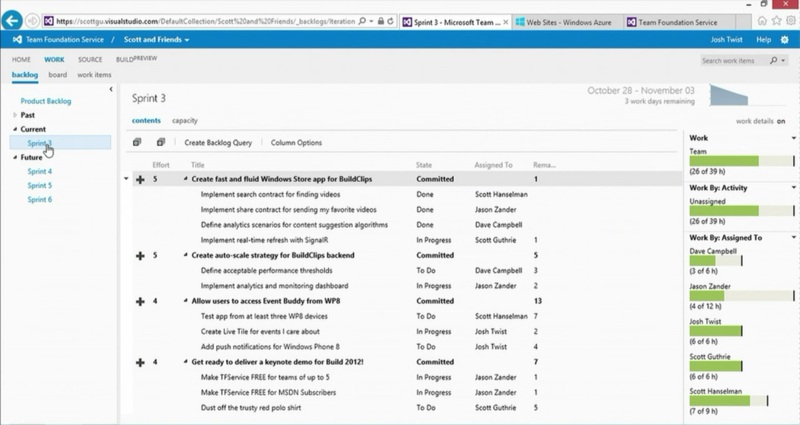
Working in an iteration requires quick decision making. At the same time, convenience with which operational information is displayed is important. An electronic task board can help with this, displaying data in sections of requirements or team members:

In this case, you can use not only the Scrum presentation, but also Kanban:
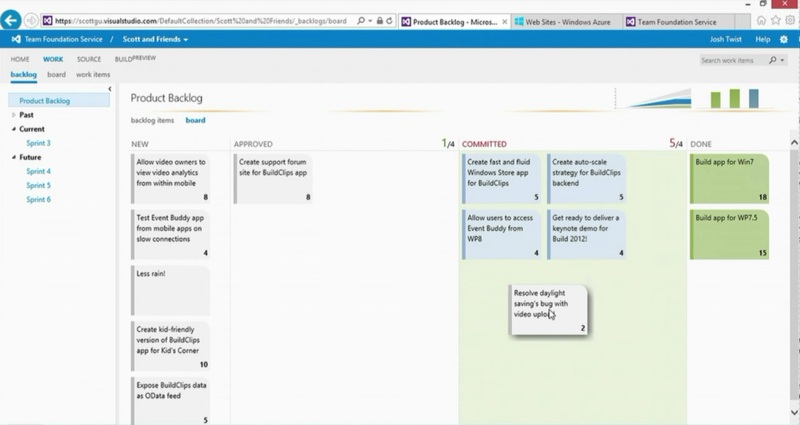
Automatic build and testing
The most interesting feature of Team Foundation Services, of course, is an integrated subsystem of assemblies, which allows you to immediately, out of the box, embody the process of continuous integration of changes (Continuous Integration). In this case, you can use both the local assembly server and the cloud one, without any need to install any additional infrastructure:

Automatic deployment
Another convenient feature of TFS is support for automatic deployment for certain types of projects. For example, you can create an assembly of a Windows Azure service project and, subject to the conditions you specify (for example, 100% passing unit tests during assembly), automatically deploy the resulting binary components to an Azure server:

Supported Platforms and Environments
Team Foundation Service clients can be the entire line of Visual Studio 2012 products, including free Express editions :

In addition, you can use the integration tools with Eclipse and Xcode (via Git).
At the same time, I would like to note that Team Foundation Services is a tool suitable not for the whole range of ALM tasks and has its limitations:
- The number of process templates is limited. You can only use built-in templates that are not possible to customize in an additional way.
- Integration with corporate services such as SharePoint, Project Server, System Centrer, etc. is not supported.
- You can only authenticate by LiveID, federation script with Active Directory is not supported yet.
- Reporting subsystems are rather limited in their capabilities.
If you have a large organization with a large number of people involved in the development, then the best solution is still to build an ALM environment based on Team Foundation Server 2012, while, of course, you can also host it in Azure. But for small teams, these moments are unlikely to become a barrier.
Prices
Currently, using Team Foundation Services is free. It will also be free in the future for teams of up to 5 people. Including the free plan will include a number of automated builds. Pricing for teams over 5 people will be announced later.
Sign up now and build your ALM environment in minutes!
 PS Brian Harry - the head of the division who created the TFS, will come to Russia on November 26 to attend Teched Russia 2012 conference . Within the framework of the conference, a pre-Day will be held - the ALM Summit conference at which he will speak, will talk about Microsoft's ALM developments, general industry trends in the organization and management of development, as well as answer your questions in a special session.
PS Brian Harry - the head of the division who created the TFS, will come to Russia on November 26 to attend Teched Russia 2012 conference . Within the framework of the conference, a pre-Day will be held - the ALM Summit conference at which he will speak, will talk about Microsoft's ALM developments, general industry trends in the organization and management of development, as well as answer your questions in a special session.Source: https://habr.com/ru/post/157009/
All Articles